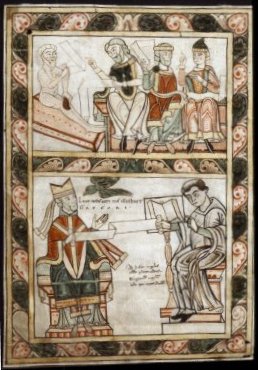|
|
MORALS
ON
THE BOOK OF JOB
BY
ST.
GREGORY THE GREAT,
TRANSLATED
WITH NOTES
AND INDICES.
__________
IN THREE VOLUMES
__________
OXFORD, JOHN HENRY PARKER;
J.G.F. AND J. RIVINGTON, LONDON. 1844.
[this
project is ongoing, in time it is hoped that all the notes will also
be added]
Complete Text available for Downloading (6.5 MB): in PDF
E-book reader version available for Downloading (3.7 MB): in epub
(with thanks to Ruth Alkema for preparing this format)

VOLUME I.
|
The Epistle
|
Wherein he explains the time,
occasion, division, plan, and the method of
discourse and of interpretation pursued in his work. |
|
THE FIRST PART.
|
|
The Preface
|
Wherein he in few words
goes through the particulars, which are to be laid open
in the course of the entire work. |
|
Book I. |
The first verses of the
first chapter of the Book of Job are explained first
historically, then in an allegorical, and lastly in a
moral sense. |
|
Book II.
|
From the sixth verse of
the first chapter to the end, he follows out the
exposition according to the threefold interpretation. |
|
Book III.
|
The whole of the second
chapter of the book of Job is explained after the manner
of the former Books, historically, allegorically, and
morally. |
|
Book IV.
|
Wherein Gregory, having
in the Preface set forth in few words, that the letter
of Scripture is at times at variance with itself, and
that the imprecations of Job, as of Jeremiah and David,
cannot be understood without absurdity according to the
sound which they convey, explains the words of Job in
historical, mystical, and moral sense, from the
commencement of the third chapter to the twentieth verse
of the same. |
|
Book V. |
He explains the remainder
of chap. iii. from ver. 20. the whole of chap. iv. and
the first two verses of chap. v. |
|
THE SECOND PART. |
|
Book VI.
|
The whole of the fifth
chapter, beginning at the third verse, is explained
first in a spiritual sense, a few parts in an
allegorical, and a great many in a moral sense. |
|
Book VII.
|
He explains the whole of
the sixth chapter, except the three last verses, in part
allegorically and in part morally. |
|
Book VIII.
|
He explains part of the
sixth chapter, from verse 27, and the whole of the
seventh and eighth chapters. In the course of this
exposition, from verse 11, to the end of the eighth
chapter, he speaks at length on the sin of hypocrisy. |
|
Book IX. |
He explains the ninth
chapter, together with the whole of the tenth. |
|
Book X. |
The whole of the eleventh
chapter of the Book of Job, and the five first verses of
the twelfth, being made out, he closes the Second Part
of this work. |
VOLUME II.
|
THE THIRD PART. |
|
Book XI.
|
In which the twelfth
chapter, from the sixth verse, the thirteenth, and the
first four verses of the fourteenth, are explained, a
different style being adopted for the time. |
|
Book XII.
|
Wherein after the
fourteenth chapter of the Book of Job has been
explained, beginning at the fifth verse, the fifteenth
chapter entire is explained for the most part in a moral
sense. |
|
Book XIII.
|
Wherein is contained a
short exposition, moral and typical, of the sixteenth
and seventeenth chapters of the Book of Job. |
|
Book XIV.
|
Wherein S. Gregory
unfolds the historical, allegorical, and moral sense of
the eighteenth and nineteenth chapters of the Book of
Job. |
|
Book XV.
|
In which there is a brief
explanation given of the twentieth and twenty-first
chapters of the Book of Job. |
|
Book XVI.
|
After going through the
twenty-second and twenty-third chapters of the Book of
Job, and the twenty-fourth to the middle of verse twenty
with a brief explanation, he brings the Third Part to a
close. |
|
THE FOURTH PART. |
|
Book XVII.
|
What remains of the
twenty-fourth chapter beginning from the middle of verse
20, together with chapters twenty-five and twenty-six
entire, he sets forth chiefly in a moral sense. |
|
Book XVIII.
|
Contains the exposition
of the twenty-seventh and twenty-eighth chapters of the
Book of Job, to the twenty-first verse and half through
it, after manifold senses. |
|
Book XIX.
|
The interpretation being
carried on from the last part of the twenty-first verse
of the twenty-eighth chapter to the twenty-first verse
of the following chapter exclusive, various meanings are
laid open not less learnedly than piously, chiefly
concerning Christ and the Church. |
|
Book XX. |
The five concluding
verses of chapter twenty-nine of the Book of Job are
more largely explained, together with the whole of
chapter thirty, chiefly on the subject of heretics and
carnal persons distressing the Church. |
|
Book XXI.
|
The thirty-first chapter
of the Book of Job is explained to verse twenty-four,
exclusive, and chastity, humility, and mercifulness
being first commended, many particulars are especially
taught relative to the avoiding of the occasion of sin. |
|
Book XXII.
|
All that remained of
chapter thirty-one of the Book of Job is explained, and
submissiveness of mind, and moderation, patience,
charity, and earnest interest for those under our
charge, are especially commended. |
VOLUME III.
|
THE FIFTH PART.
|
|
Book XXIII.
|
The thirty-second
chapter, and the thirty-third, as far as the
twenty-second verse, are expounded; in which, while Job
keeps silence, Eliu, a younger person, enters on many
right and sound topics, though not rightly, or with
sound intention.. |
|
Book XXIV.
|
The last eleven verses of
the thirty-third chapter and the eighteen first verses
of the thirty-fourth chapter are expounded, and striking
truths are taught concerning Christ the Mediator,
contemplation, the course of conversion, and the
pastoral office. |
|
Book XXV.
|
In explanation of the
thirty-fourth chapter from the nineteenth to the
thirtieth verse, the punishments of the reprobate, and
the secret judgements of God are discussed. |
|
Book XXVI.
|
The holy Doctor expounds
the seven last verses of the thirty-fourth chapter, the
whole of the thirty-fifth, with the first twenty-one
verses of the thirty-sixth chapter; and launches out, at
very great length, into both allegorical and moral
meanings. |
|
Book XXVII.
|
The last twelve verses of
the thirty-sixth chapter are expounded, with the whole
of the thirty-seventh, and their meanings ingeniously
examined, for the sake of establishing a system of
Christian doctrine, and ethics. |
|
THE SIXTH PART. |
|
Book XXVIII.
|
The first eleven verses
of the thirty-eighth chapter are explained, in various
senses, but especially in a moral sense. |
|
Book XXIX.
|
Twenty-two verses of the
thirty-eighth chapter, from the twelfth to the
thirty-third inclusive, are explained; and many truths
are taught, especially concerning the arts and snares of
Satan, grace, predestination, probation, and the secret
judgments of God. |
|
Book XXX.
|
Contains
an exposition of the last eight verses of the
thirty-eighth chapter, and of the same number of the
thirty-ninth: where the holy Doctor discusses very many
questions in a pious and learned manner, especially
concerning the preaching of the Gospel. |
|
Book XXXI.
|
The ninth,
with the remaining verses of the thirty-ninth chapter,
is explained, the last three only being omitted; and the
efficacy of Divine Grace, in the preaching of the
Gospel, and in the conversion of sinners, is especially
demonstrated. |
|
Book XXXII.
|
The two
last verses of the thirty-ninth chapter having been
explained, the first fourteen verses of the fortieth
chapter are expounded, and many things are taught, both
concerning the infinite power of God, and the hurtful
designs of Satan against men. |
|
Book XXXIII.
|
Sets forth
an exposition of the fifteenth, and remaining verses of
the fortieth chapter, and also of the first twelve
verses of the forty-first chapter: where the various
arts of the devil are exposed, and predestination of
free grace is taught, and reconciled with free will. |
|
Book XXXIV.
|
The
thirteenth, with the remaining verses of the forty-first
chapter is explained, chiefly with reference to the
pride of the Devil, and the most cruel persecutions of
Antichrist against the Saints. |
|
Book XXXV.
|
In which
many things already said are repeated in recapitulation,
and this immense work is brought to a close by a most
lowly confession of human infirmity. |
|
|

